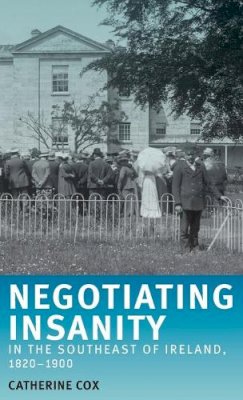
Negotiating Insanity in the Southeast of Ireland, 1820–1900
Catherine Cox
This book explores local medical, lay and legal negotiations with the asylum system in nineteenth-century Ireland. It deepens our understanding of attitudes towards the mentally ill and institutional provision for the care and containment of people diagnosed as insane. Uniquely, it expands the analytical focus beyond asylums incorporating the impact that the Irish poor law, petty session courts and medical dispensaries had on the provision of services. It provides insights into life in asylums for patients and staff. The study uses Carlow asylum district – comprised of counties Wexford, Kildare, Kilkenny and Carlow in the southeast of Ireland – to explore the ‘place of the asylum’ in the period.
This book will be useful for scholars of nineteenth-century Ireland, the history of psychiatry and medicine in Britain and Ireland, Irish studies and gender studies.
Product Details
About Catherine Cox
Reviews for Negotiating Insanity in the Southeast of Ireland, 1820–1900
.
